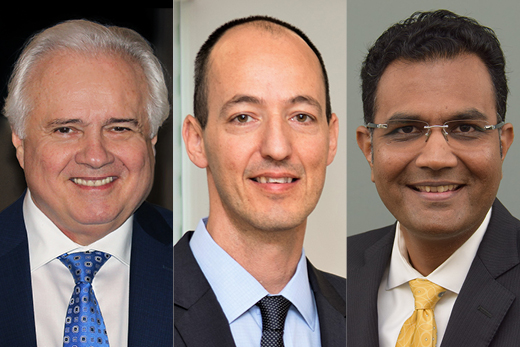GCAL & GIA Execs Talk Automated Grading and More
RAPAPORT Podcast: The Transformation of Diamond Grading The third installment of their series, Technology and the Diamond Trade Feb 1, 2021

Rapaport’s own press release pointed to how “grading laboratories are widely viewed as the guardians of trust in the diamond industry, and have a long history of using technology to authenticate the product. Labs have always played an important role in improving consumer confidence.” But with the relatively recent introduction of artificial intelligence (AI) and machine learning intended to enhance grading capabilities, the industry is witnessing potential disruption instead.
Among other topics, Palmieri and Patel explored the affects that AI and other digital initiatives will have on the grading environment. They debated the extent to with AI can resolve continuing disputes about grading inconsistencies, and how automation of grading processes might impact the trade, either negatively or positively.
“We applaud all efforts to improve accuracy and consistency in diamond grading,” began Don Palmieri. However, Don admitted while he has read and heard a lot about AI, he has yet to actually see it in action. “I opened GCAL 20 years ago to increase consumer confidence,” continued Palmieri, “but in the last 15 years the grading accuracy we’re witnessing industry-wide, has gotten worse, not better.” When asked by Krawitz what he will do to meet these challenges, Don added that “technology alone cannot solve the problem. It’s still a people business, and every employee in the GCAL lab knows that any mistake, large or small, can cost the company money and prestige.” With this in mind, and still one of the most important features of the GCAL grading system, was initiating a consumer guarantee right from the beginning. The guarantee was intended in large part to increase consumer confidence. In 2005, GCAL strengthened that guarantee. And according to Don, that guarantee has absolutely reaped benefits for GCAL. “Sadly, no other lab stepped in to guarantee their work, and now diamond grading is like the wild west.”
Questioned about GIA’s use of technology, Patel concurred that like GCAL, GIA’s mission is to protect the consumer. He also agreed the human element will not go away from grading. Even IBM agreed, at some point, humans are needed. Both Palmieri and Patel pointed to how there will always be consumers who want a personal, expert opinion of their diamond’s grade, especially important stones. GIA’s objective however, was determining how to use technology to accomplish this. So GIA partnered with IBM to bring AI to the diamond industry. When asked to respond to Palmieri’s comments about the continuing over-grading issue in the industry, Patel said everyone has to follow the same standard. Unfortunately, to Don Palmieri’s earlier point, that doesn’t seem to be the case today.
“We applaud all efforts to improve accuracy and consistency in diamond grading.” – Don Palmieri President and Founder of Gem Certification & Assurance Lab (GCAL)
The discussion also focused on the impact on lab personnel. What’s going to happen to all the graders? Will people simply be replaced by machines? The answer is apparently no. “Any time we’ve added technology in the GCAL lab,” offered Palmieri, “we had to hire new people. AI could replace some processes, so some people may need to be reassigned. But significant training will always be available. We can’t rely on technology alone.”
When asked if the industry is going to get lazy, Don took issue. “Everyone likes to see there’s a mystique in diamonds. Machines will never replace the human element and human appreciation. I still get excited when I see masterfully cut diamonds.” Even Patel admitted people are looking for an unbiased, independent opinion of the standard. So diamonds are sent to a human they can trust. “That trust can only come from that human side.”
When questioned whether GCAL is looking to shift to digital, Don responded that GCAL already has. “We have a number of customers who only get digital reports from us at this time. We have an arrangement where their end consumer can request at the point-of-purchase a printed certificate, and we’ll send it to them. Stores are notoriously guilty of losing paper reports/certs, and this way it has helped them manage things a lot easier. 15% of GCAL customers receive digital-only certs.
Pritesh talked about the large investment of time and resources that went into this new technology (AI). Palmieri responded with a challenge: “We hope that with all this new technology, GIA and other labs will guarantee their work.” The problem for other labs, however, seems to be maintaining a single standard within their multiple lab locations in many countries. “We had every opportunity to open labs overseas – at literally zero cost,” explained Don. “We were offered the real estate, the capital, even a steady flow of certification business. But we have always refused. At GCAL, we have always placed a higher value on consistent and accurate certification, than increased business and inconsistent grading, as a result of a global footprint.”
Don then took this issue one step further. “We’re more about producing an accurate product for the consumer. I think of every consumer that I’ll never meet. I’ll never know their name – but I have to think about them as a family member. And the work that I’m producing for them is the same work I would produce for my own family member. Every one of our employees has to buy into that philosophy.”
“Will all other labs adjust their grading accuracy to meet the results of technology… or will the technology be ‘adjusted’ to be consistent with the over-grading of many labs” – Don Palmieri President and Founder of Gem Certification & Assurance Lab (GCAL)
Don’s passion and respect for this business becomes quite apparent when he is asked why he’s in the laboratory business. “A lab is the last step of confidence that can be bestowed on a customer. Too many in our industry are not demanding accuracy and consistency in diamond grading. They pay lip service to it. But diamonds are the lifeblood of our industry. If someone doesn’t believe that, I don’t know what they’re selling.” Don’s comments make it more apparent why GCAL stands behind their grading with a guarantee. When asked if GIA will guarantee their grading, that decision was placed on their legal department.
ACCURACY vs CONSISTENCY
In a post-podcast discussion, both Don and Angelo (GCAL COO) expressed concern over the general public’s possible acceptance of AI’s grading results as the gospel. “Today, a lab’s grading can certainly be consistent, but that in no way equates to the accuracy of those grades,” explained Angelo. “Will all other labs adjust their grading accuracy to meet the results of technology… or will the technology be ‘adjusted’ to be consistent with the over-grading of many labs?” Don continued that same point: “We expect our grading to always be both accurate AND consistent. GCAL has always followed the standards taught by the GIA, as should all labs that use the GIA nomenclature. And the resulting grades of all labs must reflect or mirror the standards set by GIA.”
Only time will tell which path technology in the diamond industry goes down. “All we can do at GCAL is to continue to be true to our mission, and hope that the industry follows,” continued Don. For more information, or to speak with Don or Angelo Palmieri directly, feel free to call GCAL at 212-869-8985.




